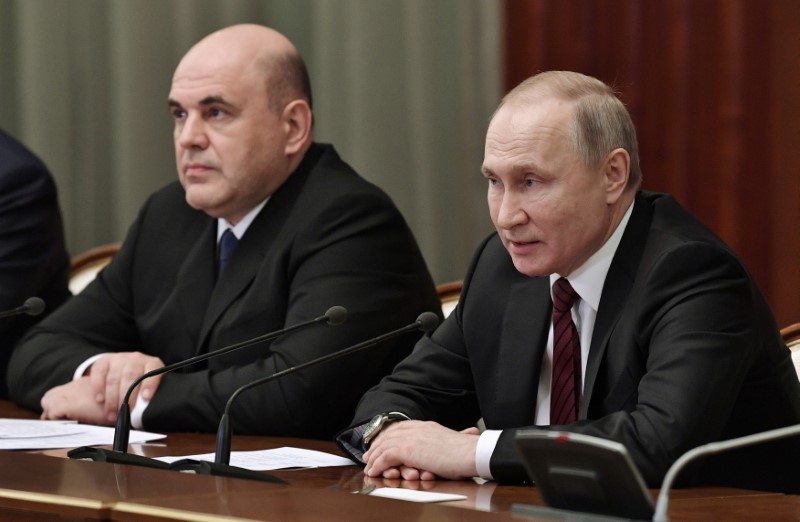By Andrey Ostroukh and Gabrielle Tétrault-Farber
MOSCOW (Reuters) - A Russian government reshuffle that brought in a new first deputy prime minister and a new economy minister is an attempt by President Vladimir Putin to secure his economic legacy, say two sources close to the government, but it also carries risks.
The reshuffle, which remodeled the government's economic decision-making bloc, is fuelling concerns about higher state spending and inflation risks, though analysts say they expect Russia's robust fiscal framework to survive.
Putin approved the new government on Tuesday and described it as a break with the past.
The sources said Putin hopes the reshuffle will help accelerate implementation of a vast state spending plan seen as the centerpiece of what may be his final presidential term.
The plan envisages breathing new life into Russia's stagnant economy by spending more than 25 trillion rubles ($404 billion) between now and 2024 on major projects in 13 areas, including health, education and infrastructure.
In the reshuffle, Andrei Belousov, Putin's economic adviser since 2013 and a key architect of the spending plans, was appointed first deputy prime minister, replacing Finance Minister Anton Siluanov who had held that role since May 2018.
Maxim (NASDAQ:MXIM) Reshetnikov, a former regional governor, was appointed Russia's new economy minister, replacing Maxim Oreshkin.
Putin, 67, is due to step down as president in 2024, though many say a proposed constitutional shake-up he is pushing through at the moment is designed to allow him to continue wielding influence in another role.
Dmitry Medvedev, Russia's prime minister since 2012, had been in charge of implementing the economic plan until Putin abruptly replaced him last week with former tax chief Mikhail Mishustin.
"Putin could see (Medvedev) wasn't doing anything, it was infuriating that he was just sitting and waiting for the presidency to fall to him again," said one of the sources who regularly meets Russian officials.
Medvedev served as Russia's president from 2008 to 2012 as the constitution barred Putin for a third consecutive term.
VISIBLE REBOOT
Putin had grown unhappy with Medvedev's failure to deliver at a time when falling real wages and declining government popularity risked deepening public anger, another source close to the government said.
The second source said Putin was concerned about the impact of falling living standards and a plan to hike the pension age, and wanted a visible reboot to assuage public anxiety and speed up the roll-out of his national projects.
"We need to realize the national projects more actively so that people feel changes to their lives and around them soon," Mishustin, Putin's new prime minister, told his cabinet at their first meeting on Tuesday.
However, the promotion of Belousov, who has a reputation as a proponent of state capitalism, is causing concern among some investors.
His appointment "implies a shift from the economic agenda and tight fiscal policy to spending and the National Projects," Alfa Bank said in a note to clients.
Higher state spending could create inflationary risks, which will limit room for further rate cuts by the central bank while wiping out Russia's budget surplus.
In the old set-up, Finance Minister Siluanov had been crucial in implementing a prudent fiscal policy, known as the budget rule, designed to shield the economy from swings in the price of oil.
But his demotion and Belousov's elevation open the door to possible change.
"The appointment of Belousov raises concerns about a softening of fiscal policy," said Kirill Tremasov, a former economy ministry official who heads research at Locko Invest firm.

However, Moody's credit rating agency said Russia would be able to cope with higher state spending, given its low public debt and the rebuilding of fiscal reserves following the implementation of its fiscal rule in 2018 and some spending under-execution in recent years.